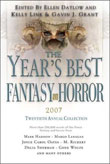|
The Year's Best Fantasy and Horror 2007 edited by Ellen Datlow, Kelly Link and Gavin J Grant Published by St. Martin's Griffin 608 pages, 2007

|
Feral Librarians and Friends Reviewed by Andi Shechter Have you ever bought a short story collection for just one story? Consider it: pony up 22 bucks for the 2007 edition of The Year’s Best Fantasy and Horror. Yes, for one story. Now, don’t get me wrong, there’s a lot of good writing here. This major anthology has something for almost every taste within the subgenres of fantasy and horror. There are also some great essays on the year in genre fiction, providing opinion, analysis, lots of titles and authors, and an overview of the genre. There are pages and pages and pages of “honorable mention” stories which didn’t make it into this hefty collection. We get Charles de Lint talking about “Music of the Fantastic.” We get a solid piece of work from Jeff VanderMeer on fantasy in comics and graphic novels, a welcome and interesting subject. Jim Frenkel provides obits -- a necessary evil in a wrap-up of a year’s work. When I opened the book, I flipped through, reserving the essays for later. I somewhat randomly chose a story, determined not to read from start to finish. And I was sold. Buy this book, and read “In the House of the Seven Librarians” by Ellen Klages. And then I dare you to raise a fuss over the cost. “What a smart reviewer that woman is.” You’ll say (oh I hope). And then you get the fun of reading all these other stories which you might like, too. But seriously folks, this is the hardest-working anthology out there. It offers work chosen by three editors, long-timer Ellen Datlow, and Kelly Link and Gavin Grant who run Small Beer Press. Klages’ story is the star of a great field. It’s a wonderful, warm, amusing, clever (and that’s a very positive word here), whimsical story about a baby left on a doorstep. In this case, the doorstep leads into a defunct Carnegie Library, closed down after the board builds a new shiny modern library across town. But the old library, and the seven librarians, do not stop just because someone decided to shut them down. And one day, a basket arrives with payment for a very, very, very overdue book -- that payment being the traditional “first-born child.” This story is just so fine. I’ve already read it twice, and giggled in different places. The sentient library takes good care of its inhabitants while the baby grows up educated, cared for and loved by the seven resident librarians who somehow never transferred to the new facility. Each of the librarians (women all) offers her knowledge and wisdom according to each specialty -- from the children’s librarian who reads to her from the git-go to Edith who teaches her to mend the old books. The child chooses her own name from the drawers of the old card catalogue, pulling down several that spell “Dinsy” and Dinsy she is (although Blithe was hoping for “Bitsy.” That’s Blithe for you.) Dinsy might be a tad spoiled but she is not without discipline; there are rules specifically designed to help her learn, like “Library paste is not food.” And “Shelves are not monkey bars” and of course, “Do not play 982-pickup with the P-Q drawer (or any other).” The story has more quotable lines and wonderful laughs. If you don’t find any of these funny, maybe this story isn’t for you. Try another one. You can find quality reads throughout the book. There’s lots to like. There’s Stephen Gallagher’s “The Box” about some completely sane men who, while training for a safety course at a maritime college, suddenly refuse to go on with their training. Terry Dowling writes a lovely little revenge story in “La Profonde” (heavy on the dialogue), about a man who takes another man on a walk one day. Well sort of. There’s creepy horror and quiet horror, silly fantasy and dark fantasy. There’s poetry -- most of which didn’t do it for me but no harm. Paul di Filippo’s “Femaville 29” uses the aftermath of fictional tsunami that leaves hundreds of thousands of people homeless and helpless to create a wonderful tale of children coping in ways far different than usual. There are ghosts and sometimes maybe there are ghosts. There are stories that are clear fantasy, clear horror and some that are a combination of both. Of course there are familiar names like Gene Wolfe and Joyce Carol Oates, Delia Sherman and M. Rickert, but there are many new names too -- new at least to me. The editors worked hard to create a very representative volume of the field as it exists. Writers from several countries are represented, all points of view, lots of information about where to find these and more are offered. They’ve done a really great job with this anthology. Although when it comes down to it, I really want you to buy it because well, how can you pass up a book with the following: “Where did you tell them you’d gone to school?” Dinsy smiled. “That was Marian’s idea. We told them I was home-schooled, raised by feral librarians.” | November 2007
Andi Shechter has been a publicist, chat host, interviewer, convention-planner, essayist and reviewer. She lives in Seattle with far too many books, an old-but-cute purple computer, not enough soft toys (including a small but select hedgehog and gorilla collection), many figure skating videotapes and an esoteric collection of hot sauces. There's a Hugo Award on her mantelpiece which belongs to her partner, cartoonist and artist Stu Shiffman. |
